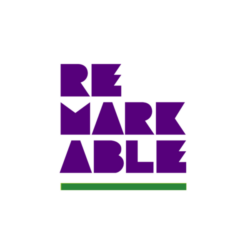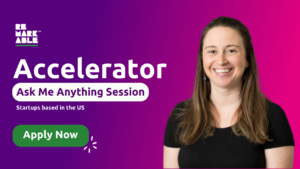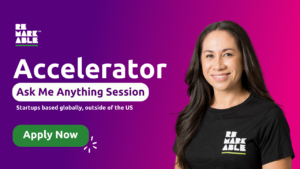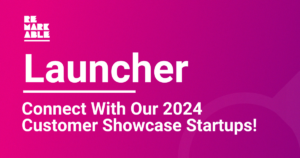Transcript
[0:00] Viv
We would like to acknowledge the traditional owners of the lands on which we record this podcast, the Gadigal people. This is their land never ceded always sacred and pay our respects to the elders past present and emerging of this place.
[0:17] Viv
Coming up on Remarkable Insights…
[0:19] Varun
So when you talk to the people for whom you’re designing there’s no substitute for that. You’ve got to figure out if you are actually solving for the right problem. The problem that you want to solve is that problem that needs to be solved.
[0:36] Viv
Viv Mullan here for the Remarkable Insights podcast which is all about disability driving innovation. On my screen in front of me is Varun Chandak, a disability entrepreneur who almost as excitedly might have a special guest join us on the podcast but I’ll let you give a visual description of who and where you are and who might be joining us.
[00:55] Varun
I am a South Asian male, I am wearing glasses, a hat, a sweatshirt and behind me there’s a couch. At some point during this podcast, my dog might make a guest appearance, so I’ll just be sure to call that out if he does.
[01:12] Viv
We welcome all dogs on this podcast. Big thank you for joining us. I had the absolute pleasure of being able to meet you in person last year. But for everyone who maybe doesn’t know of you yet, would you mind just giving a bit of an introduction into how you got to where you are at this point in your life?
[01:28] Varun
For sure. So just to set some context, I’m the founder of ‘Access to Success’, which is a not-for-profit in Canada that is. How I got here is that I have a couple of disabilities myself. I’m hard of hearing and I have what’s called ‘Erb’s Palsy’, which is a form of partial parallelism of my left arm, and a lot of the work that I do, pretty much all of the work that I do with Access to Success stems with my own lived experiences with disability, and I guess that’s what got me to where I am today.
I’m originally from India, but I came to Canada in 2016. I was in an extremely privileged position, to have access to those accommodations and offer a fact that not everybody’s experience is like that. And I’m about to answer how my experience was very much not like that when I was in India. And there, this is a unique situation, I used to attend a class, a daily class when I was studying to become a chartered accountant. That class was a class of 300 to 400 people at a time. And the guy used to walk around with the mic, obviously, and the mic wasn’t very good. So I couldn’t follow what the speaker was saying very well, and my friends were an instrument in helping me in those situations and yet other times, like in my professional career, it was hard. It was very hard. I had to work harder than every single colleague of mine just to prove that I’m first as capable as them, and then more capable than them. So in the beginning when I used to work in finance and I couldn’t talk on the phone even back then, so that led to some difficult conversations, but I worked very hard to prove to my boss that despite this limitation, I’m better than everybody else in the room, or at least I’m harder working than everybody else in the room.
[03:22] Viv
Does it feel like there was this moment in your life where you started to really understand how technology could allow you to do these things more independently rather than needing someone there to help do that sort of translation?
[03:36] Varun
I’d say that the moment I realized that technology, at least in theory, could be a game changer, was when I was first diagnosed with hearing loss. The day I was diagnosed with hearing loss I started daydreaming of a day when there would be smart contact lenses that would give me live captioning. I wanted my assistive tech to be completely invisible because that was my mentality at the time. Anyway, I still dream of that day, but that’s where it stemmed from, but at least in there, for me, it was about hiding my disability. I didn’t wanna ask for accommodations. I didn’t wanna ask for help cause I thought it would be held against me. When I applied for MBA, I didn’t actually disclose I have a disability for the same fears. But after coming here, after doing a lot of the work that I’ve done, the work that I’m doing, technology has already changed my life massively and I know the potential that it has to change my life in the future.
[04:38] Viv
Wow and do you think that perhaps technology has allowed you to feel more confident to step out and tell people that you identify as living with a disability?
[04:48] Varun
The first, yes, the second, not necessarily. Technology has helped me become independent. To give you an example, I lip read and yes the lack of technology at MBA was the catalyst and me inadvertently subconsciously picking up lip reading. I call myself extremely lucky that in a way, the pandemic hit when it did because live captioning only came into being around 2017, I would say before that it wasn’t very common, and it wasn’t very accurate. From 2017 onward was a turning point in automatic live captioning. So when the pandemic hit without live captioning, I would’ve lost all ability to communicate with people on my own, people who were wearing masks. But with live captioning, I could do that. It was, as I said, life changing for me.
[05:48] Viv
So Cool. And now can you speak a bit to the work that you do at Access to Success?
[05:53] Varun
For sure. We support the development of future leaders with disabilities and assistive technology. So in the future when kids like me search for corporate leaders with disabilities to have a good long list of people to look up to. So we do that through the Access to Success fellowship for MBA students with disabilities. Which provides up to $90,000 in annual scholarships to MBA students at four of Canada’s top business schools. We provide, in addition to that financial contribution, a lot of support, resources, mentorship opportunities networking opportunities and stuff like that to not just the recipients of the fellowship, but also any MBA student at one of our member business schools. The second part is supporting the development of assistive tech. It’s a nature, very similar to the amazing work that you and your team do at Remarkable, which is to support startups that are building products for people with disabilities.
[06:53] Viv
So Great, and what have you learned about the size of the assistive tech market in Canada and then the world?
[06:58] Varun
So speaking of people with disabilities in Canada, people with disabilities are estimated to command 82 billion dollars in annual disposable income. This is according to the research done by a Canadian Rich Donovan whose research is now world famous in this space. Globally, this market, depending on numbers, we look at, there’s several hundred billion dollars of income. If you include, for instance, friends and family of people with disabilities, caretakers for instance, that’s estimate to be a total of over a trillion dollars. Long story short, people with disabilities have a lot of money to spend.
[07:34] Viv
What do you think is the missing piece in the education systems that we are teaching people about how to build a business and build a product? What is missing from that?
[07:45] Varun
The biggest thing, the first thing really is to start with what we call ‘Co-design’. Co-design is the idea is that you design your product, your solution with people with disabilities, that means that you talk to the people for whom you’re designing that product. Far too often what happens is that really well meaning innovators coming from a really good place in their heart, make assumptions about what people with disabilities might need, and create a technological solution that might not really serve a purpose. A very prominent example is Sign Language Gloves. The idea of sign language gloves has existed since the eighties, since the 1980s. And every single year news comes out of another researcher PhD candidate who’s working on new Sign Language Gloves, and consistently the thing that they miss is actually talking to the Deaf and Hard of Hearing community about ‘what do they actually need?’. So when you talk to the people for whom you’re designing, there is no substitute for that. You gotta figure out are you actually solving for the right problem, the problem that you want to solve? Is that a problem that needs to be solved?
[08:58] Viv
And do you have examples of maybe even technology that you use in your daily life that does have that ripple effect where it is, it’s something that you use that benefits everyone else that you interact with, and then that has a flow on effect?
[09:12] Varun
Yeah, absolutely. So I have hearing loss and I rely on live captioning, so that’s the one I can talk about at length right now, for the purpose of this conversation, I’m using Google Chromes inbuilt captioning, and that’s the reason we’re able to have a fairly smooth conversation. I also use this app called Otter.ai, that’s Otter like the Animal. And it’s a great live captioning and note taking app that I’ve been using ever since I first heard of live captioning. One other technology that I want to talk about. Even though I was diagnosed with hearing loss when I was 18 or 19, I’ve never been able to speak on the phone my entire life. My family, and I just didn’t know that it’s because of my verbal cognition limitations because of certain technical limitations that I won’t bother with, essentially live captioning until very recently, didn’t work directly with phone calls. So if I want to wear my hearing aid and have the phone audio go directly to my hearing aid or my earbuds, for example, live captioning, wouldn’t pick that up because for that to work, the audio needed to be on speaker and it wasn’t very accurate cause the audio quality was very poor, until recently. Google’s Pixel phone was the first phone ever to come out with the functionality to have live captioning for phone calls. And last year I had my first ever conversation with my wife that lasted for longer than five minutes on the phone, and at the end of the conversation she goes, ‘Varun do you realise this is the first time we’ve had a real conversation on the phone?’ And I was like, ‘oh, dang! You’re right’. I’m probably never going for another phone because I’m just so attached to Pixel now because of that memory.
[11:02] Viv
How wonderful! What did that feel like in that moment?
[11:07] Varun
It was amazing! It’s the same thing, one was just like emotionally it was… so great. For the first time in my life, I can independently make phone calls by myself. It wasn’t something I could ever do before, literally to talk to my doctor. I needed to have my wife with me to talk to my bank! My bank wouldn’t talk to me on the phone because I told them that my wife is helping me, and they said ‘she’s not authorised so we can’t talk to you anymore’. I can actually have those conversations now.
[11:40] Viv
That is so cool, Varun. And at the end of these conversations I like to ask the guests that we have on our show to leave our listeners and the people enjoying this podcast with a remarkable insight. And that can be a piece of advice, words of wisdom.
[11:56] Varun
Perseverance was what did it for me, it’s what always did it for me. Like a lot of people with disabilities, I have received a lot of No’s in my life. A lot of disappointments. A lot of rejections, a lot of times things don’t pan out, where disability had a direct and real impact on those decisions and having that thick skin to take that punch. Take a day after you recover from the punch, but then the next day I get up and keep going. That perseverance was instrumental in helping me not just get where I am, but also continue going where I’m trying to get to. Times when perseverance doesn’t help is the second piece of advice, which is a sense of humor. When perseverance doesn’t help, when you’re trying and you’re trying and you’re trying and you keep getting a no, you just laugh about it, right? Maybe it’s not for everybody, but it’s what helped me a lot.






